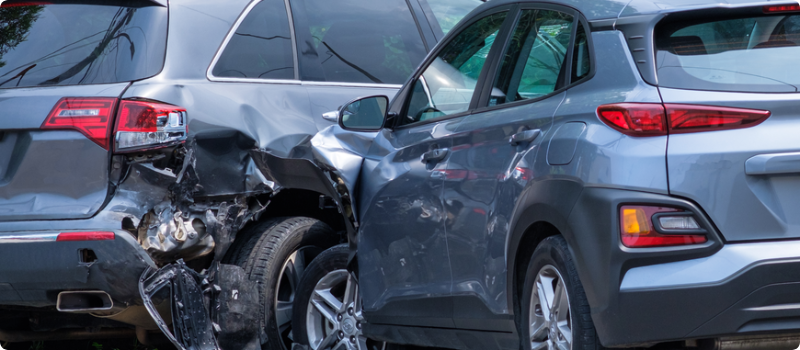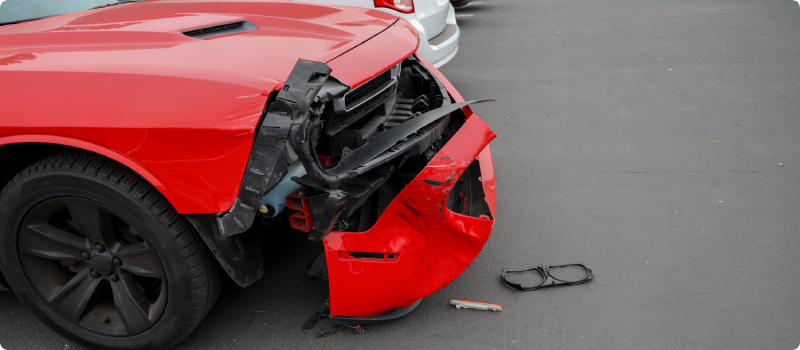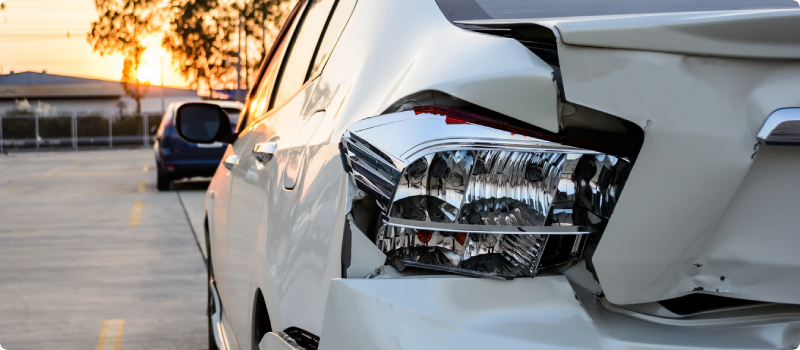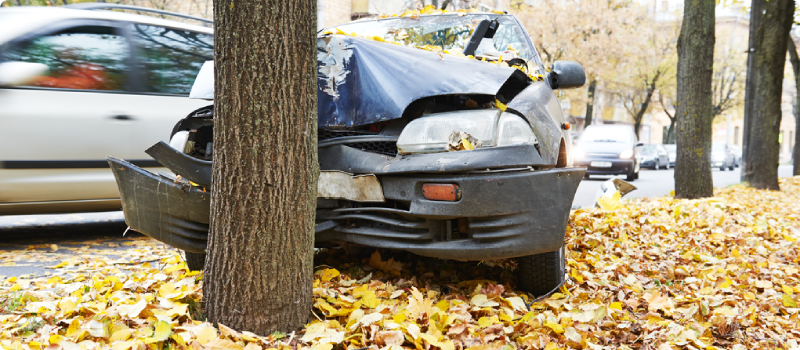What happens when a car is totaled?
Updated January 9, 2025 . AmFam Team
If you’ve been in an accident and your car takes a serious beating, your insurance company may deem it “totaled.” But what does that mean, and what do you do about it?
You need the right insurance in place before you hit the road. That’s why we’re going to review important additional protections that can make a major difference — like rental car reimbursement coverage. With it, when you’re wondering “Is my car totaled?” after an accident, you’ll have some peace of mind knowing you can rent a car and get where you’re going.
The two types of insurance coverage you’ll want on your car insurance policy — to ensure your vehicle damage is insured — are collision and comprehensive coverage.
Here’s a detailed breakdown of when a car is considered totaled and what to do if your car is totaled. This information can help you get back on the road and keep your dreams moving forward.
When is a car considered totaled?
A car is considered a total loss when the overall cost of damages approaches or exceeds the value of the car. Appraisers will estimate the cost of repairs. Factors they’ll assess include but are not limited to cost of replacement parts, salvage value and labor fees. Then they’ll determine if the cost of repairs will be higher than the car’s value on the open market.
Exactly how to know if a car is totaled is a difficult task, because the vehicle’s salvage value after the loss is factored into the decision. That value depends on the amount of damage done, plus other factors that are hard to assess offhand.
When your insurance totals your car, they’ll likely make that determination by referencing the vehicle’s actual cash value. This is the car’s purchase cost, but with subtractions based on wear and tear, condition, mileage and more. It’s how much the car is worth today, after the effects of time and use.
However, a lot more goes into this process than just one factor. To better understand what constitutes a total loss, let’s take a closer look into how a total loss's value is calculated. Then we'll get to the bottom of how much insurance pays for a totaled car.
If the airbags deployed, is the car considered a total loss?
Not necessarily. Deployed airbags are not an immediate qualifier for a total loss. However, if the cost of replacing the airbags in addition to the other damages is more than the value of your car, your vehicle will likely be a total loss.
A lot more goes into equating a total loss than just airbag deployment. As you’ll find, the answer to that all depends on the value of the car weighed against other costs. Those may include the estimate of how much the car may go for at a salvage auction. Then you add the complete cost of repairs, including towing, parts, labor and other auto-body expenses, like window replacement, paint and primer.
If you have questions about airbag replacement after an accident, our friendly insurance agents are willing and able to help!

How is total car loss value calculated?
Someday, an accident may leave you wondering, “How do I know if my car is totaled?” If this happens, you'll want to be familiar with the following terms:
Actual cash value
A claims adjuster can calculate your car’s actual cash value. To do this, they evaluate things like your vehicle's condition. Then they produce an estimate of its worth based on the make, model, year, mileage and vehicle options.
Salvage value
This number is based on the entire value of the usable parts after the accident. That means anything which is “salvageable” and has resale value, which may include tires, seats, doors, engine and electronics. If the overall sum of those items comes to less than the actual cash value of the vehicle, then it’s considered totaled.
Cost of repair
So what exactly determines if your car is totaled? Typically, that answer is a few calculations away. The adjuster will estimate the cost of repairing your vehicle to see if it’s higher or lower than its actual cash value. Then they’ll add the salvage value cost to the total repair estimate. If that figure is higher than the car’s actual cash value, the car is considered totaled in most cases.
What happens when your car is totaled and you are not at-fault?
In situations where an accident results in a total loss at the fault of another driver, the at-fault driver's insurance will usually pay you the value of your totaled vehicle.
But what happens when your car is totaled and there isn’t another driver at all? What if, for example, a tree falls onto the vehicle during a storm and damages it beyond repair? In cases like this — and if you have comprehensive coverage insurance — your insurer will likely pay you the cash value of your vehicle, minus the amount of your deductible.
A related question worth asking is, “What happens if my car is totaled and the fault is split between both drivers?” In cases when both drivers contribute to the accident, it’s best to check in with your claims representative to learn about how coverage and payouts will be managed.
Exactly how much each insurance group pays for a totaled car would depend on the amount of fault assigned to each driver. Other factors, such as specific regulations in your state, may affect the outcome as well.

What happens when an insurance company totals a car?
If your insurance company determines your car is totaled, here’s what happens next:
- Your claims adjuster will want to get your vehicle moved to a fee-free storage facility. They will probably ask you for any keys to the vehicle and will have you remove all personal items within.
- Once your vehicle is considered totaled, insurance will pay you a cash settlement. This is a check in the amount of the actual cash value on your vehicle, minus any applicable deductibles.
- If your vehicle is leased or has a loan on it, you will need to let your leasing group know that your insurance company will contact them.
- If you still owe money to a lender on your vehicle, your claims adjuster will need to pay them. For example, suppose you owe $8,000 on your vehicle loan and your vehicle is worth $10,000. Your claims adjuster will issue $8,000 to your lender and the remaining $2,000 will be issued to you. If your vehicle is leased, the payment goes directly to the leasing company.
Of course, if you own your vehicle free and clear, you’ll get the full amount. You can use it to purchase a replacement vehicle.
Do you pay a deductible when your car is totaled?
The short answer? Yes, you do. For your insurance company to pay out on the claim, they’ll subtract your deductible from the total payout. You’ll usually have to pay the full deductible regardless of how much insurance pays for a totaled car. If your car is totaled and you still owe thousands on the vehicle, you will still pay the deductible.
When buying a new car, most lenders will recommend that you pick up gap lease & loan coverage to help you manage your finances after the total loss of a new car. Does your deductible determine how much insurance pays for a totaled car? No, it doesn’t. But because it’s a cost you select when purchasing auto insurance, it can make a difference in the amount you receive for the claim. Most deductibles range from $500 - $2,000.
What does it mean if you have a $1,000 deductible? Your deductible is the amount you agree to pay out-of-pocket after a covered loss — in order to file a claim. Usually, they’re a set dollar amount. So, if you were in an accident that incurred $5,000 in damage, your insurance company would withhold the deductible of $1,000 and pay the remaining $4,000.
At American Family Insurance, we know mistakes happen, and want to help you out when we can. That’s why we offer diminishing deductible auto insurance — to help you take control of your insurance costs. After purchasing this additional coverage, you’ll pay less out-of-pocket towards your deductible for every accident-free policy term, up to a $500 maximum. Be sure to reach out to your agent and inquire about adding this key coverage.

What happens when your car gets totaled?
Usually, the insurance company will take ownership of your vehicle with a totaled car title transfer to their name. After that, they’ll likely sell it to a salvage buyer. If you decide to keep your car, the salvage value will be deducted from your settlement total.
Some states have specific guidelines relating to owner-retained total losses. Be sure to check with your claims adjuster to fully understand what this entails.
How much does insurance pay for a totaled car?
Generally, your auto insurance will pay for the actual cash value of your car, minus your deductible, after it’s determined to be totaled. Once you’ve received your settlement, you can start the process of purchasing a new vehicle to replace your totaled one.
Can I buy back my totaled car?
Many insurers will allow you to buy back a vehicle that’s been “totaled out” if you want to repair it and make it roadworthy again. However, some won’t approve comprehensive or collision coverage for it due to its salvaged status.
As for the question of “How do I buy back my totaled car?”, contact your claims representative. Be aware, though, that you may have to pay out of pocket to cover the cost.
Minus your deductible, you’ll be given the actual cash value of the vehicle. If you still owe money on the loan, you may need to pay the balance before the lender will transfer the title over to you.

If my car is totaled, do I have to pay off the loan?
If there’s still a loan on a vehicle that’s been deemed totaled, your insurance company or the at-fault driver’s insurance company will typically cut a check for your car’s actual cash value less any applicable deductibles. Let’s suppose you owe $10,000 on your auto loan, your totaled car is valued at $12,500, and your deductible is $500. Your claims adjuster will pay $10,000 to the lender. After you pay your $500 deductible, the remaining $2,000 will be issued to you.
How does gap insurance work after a car Is totaled?
Keep in mind, there is such a thing as still owing money to your lender after you receive payment from the insurance company. The insurer is only obligated to pay you for the fair market value of your car. Sometimes, when you’re financing a car, you’ll owe more money on it than its actual worth. This is called being upside-down, and it’s why you should consider adding auto lease or loan gap coverage.
Gap coverage is an additional auto coverage you can add to your auto policy. If your car is totaled and you’re upside-down, it’ll help pay for the gap between what your car is worth and what you still owe to your lender, subject to any applicable coverage limits. Speak to your agent to understand what the maximum payout amount could be.
Another important detail about this coverage is that the loan must be a vehicle loan taken out only to purchase the vehicle. So, if you used a home equity loan to purchase a vehicle, this coverage would not be available. Additionally, it doesn’t pay for items such as extended warranties, credit life insurance, loan rollover balances or late payment penalties and fees.
Stay protected with car insurance
Having a totaled car isn’t a fun situation to deal with, but knowing what comes next can help reduce some of the stress. To better protect your savings, be sure to explore additional coverages that really can make a big difference:
- Lease/loan gap coverage — Helps pay for the difference between what’s owed on the car and its actual value, in the event of a total loss. This added coverage is required on most financed or leased cars.
- Rental car reimbursement coverage — Can reimburse rental car expenses when your vehicle is undrivable due to a covered loss.
Connect with your American Family Insurance agent to find out just the right auto insurance coverages to protect you from the unexpected.
This article is for informational purposes only and based on information that is widely available. This information does not, and is not intended to, constitute legal or financial advice. You should contact a professional for advice specific to your situation.
This information represents only a brief description of coverages, is not part of your policy, and is not a promise or guarantee of coverage. If there is any conflict between this information and your policy, the provisions of the policy will prevail. Insurance policy terms and conditions may apply. Exclusions may apply to policies, endorsements, or riders. Coverage may vary by state and may be subject to change. Some products are not available in every state. Please read your policy and contact your agent for assistance.

